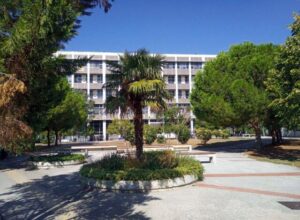Capturing carbon dioxide using algae cultivated on abandoned offshore platforms, real-time information tracking in the critical first hours after natural disasters, and wastewater sanitation in tropical coastal regions—these were the three groundbreaking environmental solutions presented by students from Aristotle University of Thessaloniki (AUTH), earning them recognition in the international student competition “Invent for the Planet.”
The competition was held simultaneously across 51 universities worldwide, under the central supervision of Texas A&M University in the U.S. In Thessaloniki, it took place from February 7 to 9, 2025, at the Walk Entrepreneurship and Innovation Center of AUTH’s Research Committee (KEDEA). Within 48 hours, AUTH students formed teams, collaborated to develop innovative solutions to global challenges, received technological and business mentorship from AUTH professors and industry professionals, created physical and digital prototypes of their solutions, and finally presented their proposals to a panel of judges. In total, six teams were formed, each selecting one of three challenges out of the six defined in the competition’s framework.
The Winning Teams
1st Place – Team Kelpiebloom
The Kelpiebloom team took first place with their innovative idea of repurposing abandoned offshore oil rigs into Kelp (a type of seaweed) farms. By absorbing carbon dioxide, these farms help boost biodiversity while also supporting scientific research. The harvested kelp can be used as a food source or biomass, while oil companies have the option to invest in this initiative, helping reduce their environmental footprint.
The team members, who will compete for a spot in the finals in Texas, USA, in early April 2025, are:
- Georgia Antoniou
- Nikitas Grammenidis
- Yasemi-Sofia Konsoula
- Anestis Livanos
- Athina Bakouri
- Isaiah Savvidou
2nd Place – Team QuickEye
The QuickEye team secured second place with a real-time transmission system designed to provide an uninterrupted stream of information during the first 72 critical hours following a natural disaster. The system is portable, easy to set up, operates autonomously for days, and restores telecommunications while gathering vital data to assist rescue teams. It consists of a base unit and a helium balloon equipped with a camera and sensors.
3rd Place – Team BioFlow
The BioFlow team took third place with a biological sanitation system designed for tropical coastal regions, capable of treating human wastewater. Their innovative approach uses a collection barrel and a basin containing Chlorella vulgaris, a type of microalgae that removes nitrogen, phosphorus, and heavy metals. The system allows for the safe disposal or reuse of treated waste for biomass production.
Next Steps in the Competition
In the next phase of the contest, the top five teams worldwide, as determined by Texas A&M University, will have the opportunity to compete in the finals in the U.S.
University Leadership on the Competition’s Impact
“Through initiatives like this, we give our students—the next generation of scientists—the chance to collaborate and design solutions that will shape a better future for everyone, using their knowledge and the university’s lab infrastructure,” said AUTH Rector, Professor Charalambos Feidas.
Meanwhile, Professor Nikolaos Michailidis of the Department of Mechanical Engineering at AUTH highlighted: “The enthusiastic participation of our student community in this global competition is proof of their eagerness and willingness to deepen their skills, apply their knowledge, and showcase their ingenuity.”
Ask me anything
Explore related questions





